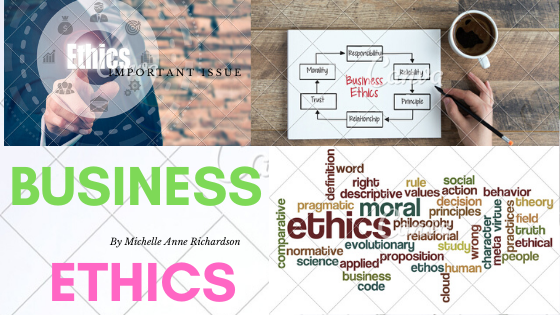Business Ethics conveys a critical impact in the corporate world. In addition to the fact that it changes how organizations work on an everyday premise, except it likewise impacts enactment around corporate guidelines. Discover what business Ethics is, the reason it is significant, and how you can spot moral and untrustworthy practices in the working environment.
What Is Business Ethics?
Business ethics is the investigation of how a business should act notwithstanding moral issues and disputable circumstances. This can incorporate various circumstances, including how a business is represented, how stocks are exchanged, a business’ job in social issues, and that’s just the beginning.
Business ethics is a wide field on the grounds that there are such a large number of various themes that fall under its umbrella. It very well may be considered from a wide range of edges, regardless of whether it’s thoughtfully, experimentally, or lawfully. Be that as it may, the law assumes the greatest job in affecting business ethics by a wide margin.
Numerous organizations influence business ethics not exclusively to stay clean from a lawful point of view, yet in addition to helping their open picture. It imparts and guarantees trust among customers and the organizations that serve them.
The cutting edge thought of business ethics as a field is generally new, yet how to morally lead business has been broadly bantered since bargaining and exchanging first emerged. Aristotle even proposed his very own couple thoughts regarding Business ethics.
Nonetheless, business ethics as we probably are aware it today emerged during the 1970s as a field of scholarly investigation. As a major aspect of the scholarly community, business ethics were both discussed rationally and estimated exactly. As this field of concentrate turned out to be progressively hearty, the administration started administering driving thoughts in the field into law, along these lines compelling organizations to submit to specific standards and guidelines that were considered ethics.
Why Is Business Ethics Important?
Business ethics are significant for an assortment of reasons. Above all else, it keeps the Business working inside the limits of the law, guaranteeing that they aren’t perpetrating wrongdoings against their representatives, clients, purchasers everywhere, or different gatherings. In any case, the business likewise has various different preferences that will assist them with succeeding on the off chance that they know about business ethics.
Organizations can likewise construct trust between the business and shoppers. In the event that shoppers feel that a business can be believed, they will be bound to pick that business over its rivals. A few organizations decide to utilize certain parts of business morals as a promoting instrument, especially on the off chance that they choose to feature a well known social issue. Utilizing business ethics astutely can bring about expanded brand value in general.
Being an ethics business is likewise exceptionally speaking to speculators and investors. They will be bound to sink cash into the organization, as adhering to standard moral strategic policies and utilizing them appropriately can be a way to progress for some organizations.
Following business ethics can likewise be valuable for the business‘ representatives and activities. Drawing in top ability is fundamentally simpler for moral organizations. Workers value a socially mindful manager, yet will likewise see them as the sort of business that will demonstrate to the greatest advantage of their representatives. This produces progressively committed workers and can likewise lessen enlistment costs.
What Are the Types of Business Ethics?
Business ethics as a field of study is unimaginably assorted, however, numerous ideas can be isolated into a couple of essential standards. Each business ought to endeavor to follow these rules in the quest for progress.
Dependability
Accomplishing dependability normally includes being straightforward and genuine in all activities and interchanges. Being reliable can have a positive effect both inside and remotely. Purchasers acknowledge receptiveness, as it furnishes them with knowledge into how a business works and conceptualizes the work that they do. Representatives likewise value this quality in a business that they work for.
Regard
Demonstrating regard for workers and clients includes finishing on all guarantees – and giving earnest statements of regret and proper remuneration in the event that anything fails to work out. Indicating an absence of regard will stop clients from drawing in with a business and lower a business’s notoriety. It will likewise harm representative confidence and increment turnover.
Reasonableness
Treating clients and workers with a feeling of reasonableness and equity is a key sort of ethics. Manipulative practices aren’t simply exploitative, yet they are additionally unhelpful – and the top need of any business ought to be useful to its clients and workers. It is additionally essential to treat all individuals similarly.
Mindful
Organizations, toward the day’s end, are made out of individuals. There are individuals that devour products or administrations from the business, and afterward, there are people that work to create those merchandise or administrations. Being available to their battles and getting together with arrangements will show sympathy – a significant device for any business to use. Demonstrating a feeling of mindful and keeping the lines of correspondence isn’t only the moral activity, yet can likewise help inside and outer view of the business.
Instances of Ethical Behavior in the Workplace
While understanding the essential standards of business ethics is significant, it is seemingly increasingly imperative to see how these thoughts apply to everyday business tasks. Here are a few instances of how ETHICS practices can be for all intents and purposes applied.
Putting Customer Needs First
Organizations that fabricate their work environment culture around putting client needs first and contracting individuals who take part right now taking an interest in moral practices. For instance, if a client comes into a store searching for an item that meets quite certain requirements, it’s critical to give them the best item to the circumstance depicted as opposed to upselling them or urging them to purchase an item that won’t address their issues. Nonetheless, guarantee that the “client first” frame of mind doesn’t accidentally bring about the dishonest treatment of representatives -, for example, urging them to work more additional time than permitted, constraining them to suffer maltreatment from clients with no sheltered method to get away from the circumstance, and the sky is the limit from there.
Being Transparent
Straightforwardness and clear correspondence are foremost with regards to moral work environment practices. Representatives and purchasers the same ought to never be misled or told falsehoods, as this breaks trust inside the business. For instance, when confronted with an advertising emergency, organizations should consider a gathering and address the issue legitimately with their workers. It’s imperative to honestly depict the circumstance as it unfurled, present arrangements, and acknowledge analysis modestly.
Organizing Workplace Diversity
Some portion of being reasonable is giving everybody an equivalent chance to be utilized at the organization. While there is a lot of political discussion around how to make work environment reasonableness, it is evident that giving an equivalent chance to work to each candidate is a moral standard. For instance, in the event that somebody sees that administration will in the general contract a similar kind of individual, they may recommend getting representatives increasingly engaged with the procuring procedure. This will acquaint alternate points of view with the employing procedure and increment the likelihood that various types of candidates will be chosen for a position.
Regarding Customer Information
Numerous organizations gather the individual data of their clients, regardless of whether it’s installment data, well being data, or comparative. One of the needs for any business ought to verify and ensuring this data. For instance, a medical clinic may make and implement forceful arrangements around staff sharing patient data via web-based networking media. Having a representative offer this sort of data on their own records isn’t just rude of the patient’s security, yet could likewise put the clinic in danger of disregarding HIPAA guidelines.
Giving Resources to Reporting Unethical Behavior
In the event that a worker sees unscrupulous conduct in the work environment. They ought to have an outlet to report these practices. The business is liable for setting up this framework and planning it in a manner. In a way that protects the representative from hurt. For instance, an examination college ought to have an impartial office of consistence. Which is hierarchically separated from the exploration arm of the establishment. This gives a nonpartisan space where scholastics can report untrustworthy investigations. Or also unsafe practices unafraid of work environment repercussions.
Instances of Unethical Behavior in the Workplace
Similarly, as it is critical to see how to essentially apply moral conduct, it is similarly imperative to comprehend what qualifies as deceptive conduct. Here are a few instances of what unscrupulous circumstances can resemble in the working environment.
Favoring one side in an Employee Argument
It isn’t phenomenal for clashes to emerge between representatives in the work environment. Morally, it is the activity of the organization initiative and the board to stay unbiased during these contentions. For instance, if two of a director’s workers are in strife, it is significant for the supervisor to stay as unbiased as would be prudent. At the point when an administrator offers an inclination to a most loved or senior worker or gives an answer that lone works for one gathering, they are taking part in exploitative conduct. They should permit the two representatives to express their real thoughts and afterward go to an answer that works best for the two gatherings, just as the business itself.
Lying
Misleading your workers or clients is the greatest method to break trust. Trust is the best wellspring of devotion and steadfastness that any business has. When that trust is broken, it is very hard to get it back. For instance, if an organization has a high-performing representative who is requesting an advancement, they may state that there is no room in the financial limit for advancement this year. A couple of months after the fact, another worker may get an advancement. Lying isn’t simply exploitative – it will drive individuals from your business.
Business ethics definition
Profound principles of bookkeeping are Ethics. As citizens of society, you need to understand that ethical conduct and ethics are crucial in the world and your community normally. Ethics is an essential feature of civilization. Reminders of the are presented from the internet, TV, and papers. Do you read or hear on-line advertising scams, stories about fraud, misconduct, credit card scams? What about people who’re victims of rip off scams or parents who fail to abuse their children or to take care of? I’m sure you’ve heard about authorities bribery, misconduct, and Wall Street scandals. Ethics are what’s right and wrong, bad or good, or with morality and obligations.
They’re rules of behavior that guide a business, profession, individual or regulating body. Everybody who’s able to make her or his own decisions is accountable for making moral and ethical decisions. Moral liability should be the primary focus of every individual. The world situation is in problem due to behaviors in government and business. Society should convey concern and realize today that issues plague the business ethics definition. Most banks together with other companies may need to review and revise their code of ethics. In practice, high standards must be put For society to rise above this current crisis. Ethics is very good for business and communities, in fact, Ethics is Good Company For more information on accounting, accounting bases and software.
Ethical issues in business
Business ethics is the study of correct business policies and practices related to undoubtedly arguable issues, such as corporate governance, corporate executive commercialism, bribery, discrimination, corporate social responsibility, and fiduciary responsibilities. The law generally guides business ethics, while business ethics at alternative times provides a basic framework that companies can favor following to achieve public acceptance.
Ethical dilemmas in business
Business ethics ensures that there is a definitive level of trust between buyers and numerous types of market participants with companies. As an example, a portfolio manager should offer similar thinking to relationship portfolios and individual small investors. Such practices ensure that the general public is treated truthfully.
The idea of business ethics emerged in the 1960s when companies became very attuned to a growing consumer-based society that displayed considerations related to the environment, social causes, and corporate responsibility. Business ethics goes the other way simply as an ethical code of right and wrong; it tries to reconcile what companies must do wrongly instead of maintaining a competitive advantage over alternative companies. Corporations display business ethics in many ways.
Case studies
For an organization that sells cereals with all-natural ingredients, the sales department must moderate enthusiasm for the merchandise against the laws that govern labeling practices. Advertisements by some competitors promote fiber-rich cereals that have the potential to reduce the danger of some cancers. The cereal company in question needs to achieve greater market share, however, the sales department cannot generate dubious health claims on the cereal boxes, or is at risk of legal proceedings and fines. Although WHO’s competitors have a larger share of the grain business market, it uses suspicious labeling practices, which does not mean that every manufacturer should interact with unethical behavior.
Another case study involves quality control for an organization that manufactures electronics for portable servers. These items must be shipped on time, or the item manufacturer risks losing a lucrative contract. The standard management department discovers a possible defect and each part of a load faces controls. Unfortunately, checks can take too long, and so the window for on-time shipment may pass, and that in turn delays the release of the customer’s product. The standard management department has the option of shipping the items, hoping not all of them are defective, or the company will delay loading and analyze everything. If the item area unit is defective, the company purchasing the items may face a backlash from the buyer, which may cause the customer to search for another reliable supplier.
Statistics
The National Business Ethics Survey comes out every 2 years. In the 2013 edition, respondents considered that the Associate in Nursing is very cheap in unethical behaviors. Around the forty-first, staff saw misconduct on the task, compared to the forty-fifth in 2011. The survey concluded that the Nursing Associate is likely unsure of the LED economic climate to less risk-taking in companies for the purpose of profit, which led many managers and executives to act. highly ethically The survey found that hours of misconduct occurred on the job among managers, and twenty-five of the staff detained senior managers for unethical behavior
Global Business Ethics
The field of ethics is a branch of philosophy that seeks virtue and morality. Addressing questions about “right” and “wrong” behavior for people in a variety of settings. The standards of behavior that tell how human beings ought to act. Is a branch of philosophy that seeks to address questions about morality? — That is, about concepts such as good and bad, right and wrong, justice, and virtue. Ethics impacts many fields, not just business. Including medicine, government, and science, to name a few.
We must first try to understand the “origins of ethics”. Whether they come from religion, philosophy, the laws of nature, scientific study, the study of political theory relating to ethical norms created in society or other fields of knowledge. The description below on the field of ethics shows how people think about ethics in stages, from where ethical principles come from to how people should apply them to specific tasks or issues.
This approach will be used in this chapter to help you understand global business ethics in a modern and current sense. As with this chapter’s review of culture, this section on global business ethics is less about providing you with a tangible list of dos and don’ts than it is about helping you understand the thinking and critical issues that global managers must deal with on an operational and strategic basis.
Where Do Our Values Come From?
Just as people look to history to understand political, technical, and social changes, so too do they look for changes in thinking and philosophy. There is a history of how thinking has evolved over time. What may or may not have been acceptable just a hundred years ago may be very different today—from how people present themselves and how they act and interact with customs, values, and beliefs.
Ethics could define as a system of moral standards or values. Cultural beliefs and programming influence our values. A sense of ethics is determining the number of social, cultural, and religious factors. This sense influences us beginning early in childhood. People are taught how to behave by their families, exposure to education and thinking, and the society in which they live. Ethical behavior also refers to behavior that is generally accepted within a specific culture. Some behaviors are universally accepted—for example, people shouldn’t physically hurt other people. Other actions are less clear, such as discrimination based on age, race, gender, or ethnicity.
Business Ethics in Cultural Impacts
Culture impacts how local values influence global business ethics. There are differences in how much importance cultures place on specific ethical behaviors. For example, bribery remains widespread in many countries, and while people may not approve of it, they accept it as a necessity of daily life. Each professional influences the values, social programming, and experiences encountering from childhood on. These collective factors impact how a person perceives an issue and the related correct or incorrect behaviors.
Even within a specific culture, individuals have different ideas of what constitutes ethical or unethical behavior. Judgments may differ greatly depending on an individual’s social or economic standing, education, and experiences with other cultures and beliefs. Just as in the example of bribery, it should be noted that there is a difference between ethical behavior and normal practice. It may be acceptable to discriminate in certain cultures, even if the people in that society know that it is not right or fair. In global business ethics, people try to understand what ethical action is and what the normal practice might be. If these are not consistent, the focus is placing on how to encourage ethical actions.
Business Ethics and Dealing with Competition
One major question is whether the red-hot market competition brought on by globalization will lead to shadier business conduct in the future. The survey asked respondents to identify the factors most likely to cause people to compromise an organization’s ethical standards. The top answer, by far, was “pressure to meet unrealistic business objectives/deadlines.” If emerging businesses in China, India and elsewhere drive managers to set unrealistic business goals, then companies could see a whole other era of scandals. Where business ethics are very needy things in the real estate business as well. Singapore’s Treasure at Tampines is on the mark as well.
But survey respondents seem to expect greater pressure to behave ethically. One factor that jumps out as being a lot more important in the future is the “corporate social responsibility (CSR) movement.” It’s clear that business professionals expect to hold it to higher CSR standards in the year 2015.
Environmental Responsibilities
An even more radical shift may be the growing importance of “environmental issues,” which respondents predict will be the second most important external driver of business ethics (out of 10 drivers) in 10 years; it is in the ninth position today. The regional differences are particularly interesting. U.S. respondents, who made up about half of total participants, ranked environmental issues as the seventh most important driver in 2015. Canadians, Europeans and Asians, however, rated environmental issues as much more important, accounting for its overall high ranking. It seems that a large proportion of non-U.S. business professionals anticipate a world of “green ethics.”
Corporate Culture and Business Ethics


Other research on business ethics has demonstrated that corporate cultures play an even greater role than formal programs when it comes to preventing unethical behaviors in organizations (Harned, Seligson, & Baviskar, 2005). But what processes can actually ensure such a culture? The AMA/HRI survey found that leaders are the key to culture. The top-ranked process was having “leaders support and model ethical behavior,” and the second-ranked process was having “consistent communications from all leaders.”
The survey also finds that the single most important ethical leadership behavior is “keeping promises”. Followed by “encouraging open communication,” “keeping employees informed,” and “supporting employees who uphold ethical standards.” If an organization has leaders who simply don’t “walk the talk” when it comes to ethics, there’s little hope of maintaining a strong ethical culture.
As for specific programs and practices, a corporate code of conduct is viewed as being most important. Such a code must reflect and reinforce the values and principles of an organization. Rounding out the top five programs are “ethics training for all members of the organization,” “CSR programs,” “ombudsman services,” and “helplines.” In summary, employees need to have a code to set the ethics foundation, training to help people truly understand it, and programs that permit them to inquire about and report ethical violations.
Facing the Challenges of Ethics in the Business World
Of course, simply putting such programs in place isn’t enough; organizations need to find ways to measure their effectiveness. The AMA/HRI survey found that the best ways of doing this are through ethics surveys, customer complaints, and ethics audits.
Going forward, it’s clear that ethics challenges will evolve as globalization continues. The survey finds that the top-ranked ethics-related global workplace issues linked to working conditions. With the highest-ranked ones including forced labor, child labor, health and safety, and discrimination/harassment. As corporate operations and suppliers spread to every corner of the world, one of the primary concerns of business is to make sure the rights of all employees are properly safeguarded.
Along with being ethical in a corporation, establish trust is vital as well. Sign up for our free webcast to learn how leaders can build trust within the organization.
Ethics has become a bunk within the company world. the explanation for this can be the globalization and also the explosion within the communication within the organization. As a result, businesses square measure focusing a lot of on ethics half. the foundations or the principles of the organization ought to be maintained. Business ethics square measure gave a lot of importance these days.
Business Ethics Responsive
Social Responsibility thought and wish
Kinds of Social Responsibility
Business Ethics
Ethics means that the set of rules or principles that the organization ought to follow. Whereas in business ethics refers to a code of conduct that companies square measure expected to follow whereas doing business.
Through ethics, a regular is ready for the organization to control their behavior. This helps them in identifying between the incorrect and also the right a part of the companies.
The ethics that square measure fashioned within the organization aren’t rocketing science. They support the creation of somebody’s mind. That’s why ethics depend upon the influence of the place, time, and also the scenario.
The Code of conduct is another term that is using extensively in businesses these days. It’s a group of rules that square measure thought-about as binding by the folks operating within the organization.
Business ethics trends
Business ethics compromises of these values and principles and helps in guiding the behavior within the organizations. Businesses ought to have a balance between the requirements of the stakeholders and their need to form profits.
While maintaining these balances, again and again, businesses need to try and do trade-offs. To combat such situations, rules and principles square measure fashioned within the organization.
This ensures that companies gain cash while not touching the people or society as an entire. The ethics concerned within the businesses replicate the philosophy of that organization.
One of these policies determines the basics of that organization. As a result, businesses usually have moral principles. there’s a listing of moral principles concerned within the businesses.
Ethics in numerous Departments
Ethical Principles in Businesses from AN Indian Perspective
Essentially, any businesses that run in the Republic of India include those moral principles.
Integrity
Whenever there’s nice pressure to try and do right rather than maximizing profits, this principle then tasted. The executives got to demonstrate bravery and private integrity, by doing what-what suppose is correct.
These square measure the principles, that square measure upright, honorable. they have to fight for his or her beliefs. For these principles, they’ll not back off and be insincere or expertise.
Loyalty
No moral behavior promotes while not trust. And for trust, loyalty must be incontestable. The executives got to be ought to have this trust whereas remaining loyal to the establishments and also the person. There ought to be friendly relationship within the time of adversity and support and devotion for the duty.
They should not use or disclose personal data. This results in confidence within the organization. They ought to safeguard the power of an expert to form AN freelance call by avoiding any quite influence or the conflicts of interest.
So, they ought to stay loyal to their company and their colleagues. Once they settle for the opposite workers, they have to supply an inexpensive time to the firm and respect the proprietary data attach to the previous firm. Thus, they ought to refuse to require half in any activity which may take the undue advantage of the firm.
Honesty
The ethical executives square measure honest whereas coping with their regular work. They conjointly got to be truthful and don’t deliberately deceive or mislead the knowledge to others. There ought to be AN turning away of the partial truths, overstatements, misrepresentations, etc. Thus, they ought to not have selective omission by any means that attainable.
Respect and Concern
There square measure 2 essentially totally different kinds of behavior within the organization. However they are going in bicycle-built-for-two that’s why they need been anesthetize one principle. Once the chief is moral he’s compassionate, kind, and caring.
There is one golden rule that states that facilitate those that square measure in want. Further, obtain their accomplishments in such a way that the business objectives of the firm square measure achieved.
The executives conjointly got to show respect towards the employee’s dignity, privacy, autonomy, and rights. He must maintain the interests of all those whose choices square measure at stake. They have to be courteous and treat the person equally and justly.
Fairness
The executives needn’t be simply truthful all told the dealings. However they conjointly shouldn’t exercise the incorrect use of their power. They ought to not try and use over every or alternative indecent manners to achieve any style of advantage. Also, they ought to not take undue advantage of something or alternative people’s mistakes.
Fair folks square measure inclined a lot of towards justice and make sure that the folks square measure equally treated. They ought to tolerant, broad-minded, willing to admit their own mistakes. The executives ought to even be ready to modification their beliefs and positions supported true.
Leadership
Any Government if ethical, ought to be a front-runner to others. They ought to be ready to handle the responsibilities. They ought to remember of the opportunities because of their position. The executives got to be a correct model for others. For more updates stay with us
 Best Business Ideas Open up your business to new possibilities.
Best Business Ideas Open up your business to new possibilities.








